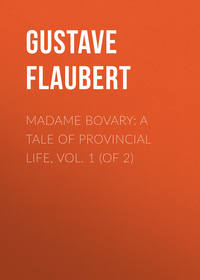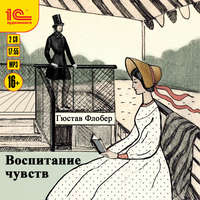 полная версия
полная версияSentimental Education; Or, The History of a Young Man. Volume 1
And, as he wished to go out, Deslauriers went into the kitchen, which also served as his dressing-room. On the stone floor, beside a pair of boots, were to be seen the remains of a meagre breakfast, and a mattress with a coverlid was rolled up on the floor in a corner.
"This will show you," said he, "that I receive few marchionesses. 'Tis easy to get enough of them, ay, faith! and some others, too! Those who cost nothing take up your time – 'tis money under another form. Now, I'm not rich! And then they are all so silly, so silly! Can you chat with a woman yourself?"
As they parted, at the corner of the Pont Neuf, Deslauriers said: "It's agreed, then; you'll bring the thing to me to-morrow as soon as you have it!"
"Agreed!" said Frederick.
When he awoke next morning, he received through the post a cheque on the bank for fifteen thousand francs.
This scrap of paper represented to him fifteen big bags of money; and he said to himself that, with such a sum he could, first of all, keep his carriage for three years instead of selling it, as he would soon be forced to do, or buy for himself two beautiful damaskeened pieces of armour, which he had seen on the Quai Voltaire, then a quantity of other things, pictures, books and what a quantity of bouquets of flowers, presents for Madame Arnoux! anything, in short, would have been preferable to risking losing everything in that journal! Deslauriers seemed to him presumptuous, his insensibility on the night before having chilled Frederick's affection for him; and the young man was indulging in these feelings of regret, when he was quite surprised by the sudden appearance of Arnoux, who sat down heavily on the side of the bed, like a man overwhelmed with trouble.
"What is the matter now?"
"I am ruined!"
He had to deposit that very day at the office of Maître Beaumont, notary, in the Rue Saint-Anne, eighteen thousand francs lent him by one Vanneroy.
"'Tis an unaccountable disaster. I have, however, given him a mortgage, which ought to keep him quiet. But he threatens me with a writ if it is not paid this afternoon promptly."
"And what next?"
"Oh! the next step is simple enough; he will take possession of my real estate. Once the thing is publicly announced, it means ruin to me – that's all! Ah! if I could find anyone to advance me this cursed sum, he might take Vanneroy's place, and I should be saved! You don't chance to have it yourself?"
The cheque had remained on the night-table near a book. Frederick took up a volume, and placed it on the cheque, while he replied:
"Good heavens, my dear friend, no!"
But it was painful to him to say "no" to Arnoux.
"What, don't you know anyone who would – ?"
"Nobody! and to think that in eight days I should be getting in money! There is owing to me probably fifty thousand francs at the end of the month!"
"Couldn't you ask some of the persons that owe you money to make you an advance?"
"Ah! well, so I did!"
"But have you any bills or promissory notes?"
"Not one!"
"What is to be done?" said Frederick.
"That's what I'm asking myself," said Arnoux. "'Tisn't for myself, my God! but for my children and my poor wife!"
Then, letting each phrase fall from his lips in a broken fashion:
"In fact – I could rough it – I could pack off all I have – and go and seek my fortune – I don't know where!"
"Impossible!" exclaimed Frederick.
Arnoux replied with an air of calmness:
"How do you think I could live in Paris now?"
There was a long silence. Frederick broke it by saying:
"When could you pay back this money?"
Not that he had it; quite the contrary! But there was nothing to prevent him from seeing some friends, and making an application to them.
And he rang for his servant to get himself dressed.
Arnoux thanked him.
"The amount you want is eighteen thousand francs – isn't it?"
"Oh! I could manage easily with sixteen thousand! For I could make two thousand five hundred out of it, or get three thousand on my silver plate, if Vanneroy meanwhile would give me till to-morrow; and, I repeat to you, you may inform the lender, give him a solemn undertaking, that in eight days, perhaps even in five or six, the money will be reimbursed. Besides, the mortgage will be security for it. So there is no risk, you understand?"
Frederick assured him that he thoroughly understood the state of affairs, and added that he was going out immediately.
He would be sure on his return to bestow hearty maledictions on Deslauriers, for he wished to keep his word, and in the meantime, to oblige Arnoux.
"Suppose I applied to M. Dambreuse? But on what pretext could I ask for money? 'Tis I, on the contrary, that should give him some for the shares I took in his coal-mining company. Ah! let him go hang himself – his shares! I am really not liable for them!"
And Frederick applauded himself for his own independence, as if he had refused to do some service for M. Dambreuse.
"Ah, well," said he to himself afterwards, "since I'm going to meet with a loss in this way – for with fifteen thousand francs I might gain a hundred thousand! such things sometimes happen on the Bourse – well, then, since I am breaking my promise to one of them, am I not free? Besides, when Deslauriers might wait? No, no; that's wrong; let us go there."
He looked at his watch.
"Ah! there's no hurry. The bank does not close till five o'clock."
And, at half-past four, when he had cashed the cheque:
"'Tis useless now; I should not find him in. I'll go this evening." Thus giving himself the opportunity of changing his mind, for there always remain in the conscience some of those sophistries which we pour into it ourselves. It preserves the after-taste of them, like some unwholesome liquor.
He walked along the boulevards, and dined alone at the restaurant. Then he listened to one act of a play at the Vaudeville, in order to divert his thoughts. But his bank-notes caused him as much embarrassment as if he had stolen them. He would not have been very sorry if he had lost them.
When he reached home again he found a letter containing these words:
"What news? My wife joins me, dear friend, in the hope, etc. – Yours."
And then there was a flourish after his signature.
"His wife! She appeals to me!"
At the same moment Arnoux appeared, to have an answer as to whether he had been able to obtain the sum so sorely needed.
"Wait a moment; here it is," said Frederick.
And, twenty-four hours later, he gave this reply to Deslauriers:
"I have no money."
The advocate came back three days, one after the other, and urged Frederick to write to the notary. He even offered to take a trip to Havre in connection with the matter.
At the end of the week, Frederick timidly asked the worthy Arnoux for his fifteen thousand francs. Arnoux put it off till the following day, and then till the day after. Frederick ventured out late at night, fearing lest Deslauriers might come on him by surprise.
One evening, somebody knocked against him at the corner of the Madeleine. It was he.
And Deslauriers accompanied Frederick as far as the door of a house in the Faubourg Poissonnière.
"Wait for me!"
He waited. At last, after three quarters of an hour, Frederick came out, accompanied by Arnoux, and made signs to him to have patience a little longer. The earthenware merchant and his companion went up the Rue de Hauteville arm-in-arm, and then turned down the Rue de Chabrol.
The night was dark, with gusts of tepid wind. Arnoux walked on slowly, talking about the Galleries of Commerce – a succession of covered passages which would have led from the Boulevard Saint-Denis to the Châtelet, a marvellous speculation, into which he was very anxious to enter; and he stopped from time to time in order to have a look at the grisettes' faces in front of the shop-windows, and then, raising his head again, resumed the thread of his discourse.
Frederick heard Deslauriers' steps behind him like reproaches, like blows falling on his conscience. But he did not venture to claim his money, through a feeling of bashfulness, and also through a fear that it would be fruitless. The other was drawing nearer. He made up his mind to ask.
Arnoux, in a very flippant tone, said that, as he had not got in his outstanding debts, he was really unable to pay back the fifteen thousand francs.
"You have no need of money, I fancy?"
At that moment Deslauriers came up to Frederick, and, taking him aside:
"Be honest. Have you got the amount? Yes or no?"
"Well, then, no," said Frederick; "I've lost it."
"Ah! and in what way?"
"At play."
Deslauriers, without saying a single word in reply, made a very low bow, and went away. Arnoux had taken advantage of the opportunity to light a cigar in a tobacconist's shop. When he came back, he wanted to know from Frederick "who was that young man?"
"Oh! nobody – a friend."
Then, three minutes later, in front of Rosanette's door:
"Come on up," said Arnoux; "she'll be glad to see you. What a savage you are just now!"
A gas-lamp, which was directly opposite, threw its light on him; and, with his cigar between his white teeth and his air of contentment, there was something intolerable about him.
"Ha! now that I think of it, my notary has been at your place this morning about that mortgage-registry business. 'Tis my wife reminded me about it."
"A wife with brains!" returned Frederick automatically.
"I believe you."
And once more Arnoux began to sing his wife's praises. There was no one like her for spirit, tenderness, and thrift; he added in a low tone, rolling his eyes about: "And a woman with so many charms, too!"
"Good-bye!" said Frederick.
Arnoux made a step closer to him.
"Hold on! Why are you going?" And, with his hand half-stretched out towards Frederick, he stared at the young man, quite abashed by the look of anger in his face.
Frederick repeated in a dry tone, "Good-bye!"
He hurried down the Rue de Bréda like a stone rolling headlong, raging against Arnoux, swearing in his own mind that he would never see the man again, nor her either, so broken-hearted and desolate did he feel. In place of the rupture which he had anticipated, here was the other, on the contrary, exhibiting towards her a most perfect attachment from the ends of her hair to the inmost depths of her soul. Frederick was exasperated by the vulgarity of this man. Everything, then, belonged to him! He would meet Arnoux again at his mistress's door; and the mortification of a rupture would be added to rage at his own powerlessness. Besides, he felt humiliated by the other's display of integrity in offering him guaranties for his money. He would have liked to strangle him, and over the pangs of disappointment floated in his conscience, like a fog, the sense of his baseness towards his friend. Rising tears nearly suffocated him.
Deslauriers descended the Rue des Martyrs, swearing aloud with indignation; for his project, like an obelisk that has fallen, now assumed extraordinary proportions. He considered himself robbed, as if he had suffered a great loss. His friendship for Frederick was dead, and he experienced a feeling of joy at it – it was a sort of compensation to him! A hatred of all rich people took possession of him. He leaned towards Sénécal's opinions, and resolved to make every effort to propagate them.
All this time, Arnoux was comfortably seated in an easy-chair near the fire, sipping his cup of tea, with the Maréchale on his knees.
Frederick did not go back there; and, in order to distract his attention from his disastrous passion, he determined to write a "History of the Renaissance." He piled up confusedly on his table the humanists, the philosophers, and the poets, and he went to inspect some engravings of Mark Antony, and tried to understand Machiavelli. Gradually, the serenity of intellectual work had a soothing effect upon him. While his mind was steeped in the personality of others, he lost sight of his own – which is the only way, perhaps, of getting rid of suffering.
One day, while he was quietly taking notes, the door opened, and the man-servant announced Madame Arnoux.
It was she, indeed! and alone? Why, no! for she was holding little Eugène by the hand, followed by a nurse in a white apron. She sat down, and after a preliminary cough:
"It is a long time since you came to see us."
As Frederick could think of no excuse at the moment, she added:
"It was delicacy on your part!"
He asked in return:
"Delicacy about what?"
"About what you have done for Arnoux!" said she.
Frederick made a significant gesture. "What do I care about him, indeed? It was for your sake I did it!"
She sent off the child to play with his nurse in the drawing-room. Two or three words passed between them as to their state of health; then the conversation hung fire.
She wore a brown silk gown, which had the colour of Spanish wine, with a paletot of black velvet bordered with sable. This fur made him yearn to pass his hand over it; and her head-bands, so long and so exquisitely smooth, seemed to draw his lips towards them. But he was agitated by emotion, and, turning his eyes towards the door:
"'Tis rather warm here!"
Frederick understood what her discreet glance meant.
"Ah! excuse me! the two leaves of the door are merely drawn together."
"Yes, that's true!"
And she smiled, as much as to say:
"I'm not a bit afraid!"
He asked her presently what was the object of her visit.
"My husband," she replied with an effort, "has urged me to call on you, not venturing to take this step himself!"
"And why?"
"You know M. Dambreuse, don't you?"
"Yes, slightly."
"Ah! slightly."
She relapsed into silence.
"No matter! finish what you were going to say."
Thereupon she told him that, two days before, Arnoux had found himself unable to meet four bills of a thousand francs, made payable at the banker's order and with his signature attached to them. She felt sorry for having compromised her children's fortune. But anything was preferable to dishonour; and, if M. Dambreuse stopped the proceedings, they would certainly pay him soon, for she was going to sell a little house which she had at Chartres.
"Poor woman!" murmured Frederick. "I will go. Rely on me!"
"Thanks!"
And she arose to go.
"Oh! there is nothing to hurry you yet."
She remained standing, examining the trophy of Mongolian arrows suspended from the ceiling, the bookcase, the bindings, all the utensils for writing. She lifted up the bronze bowl which held his pens. Her feet rested on different portions of the carpet. She had visited Frederick several times before, but always accompanied by Arnoux. They were now alone together – alone in his own house. It was an extraordinary event – almost a successful issue of his love.
She wished to see his little garden. He offered her his arm to show her his property – thirty feet of ground enclosed by some houses, adorned with shrubs at the corners and flower-borders in the middle. The early days of April had arrived. The leaves of the lilacs were already showing their borders of green. A breath of pure air was diffused around, and the little birds chirped, their song alternating with the distant sound that came from a coachmaker's forge.
Frederick went to look for a fire-shovel; and, while they walked on side by side, the child kept making sand-pies in the walk.
Madame Arnoux did not believe that, as he grew older, he would have a great imagination; but he had a winning disposition. His sister, on the other hand, possessed a caustic humour that sometimes wounded her.
"That will change," said Frederick. "We must never despair."
She returned:
"We must never despair!"
This automatic repetition of the phrase he had used appeared to him a sort of encouragement; he plucked a rose, the only one in the garden.
"Do you remember a certain bouquet of roses one evening, in a carriage?"
She coloured a little; and, with an air of bantering pity:
"Ah, I was very young then!"
"And this one," went on Frederick, in a low tone, "will it be the same way with it?"
She replied, while turning about the stem between her fingers, like the thread of a spindle:
"No, I will preserve it."
She called over the nurse, who took the child in her arms; then, on the threshold of the door in the street, Madame Arnoux inhaled the odour of the flower, leaning her head on her shoulder with a look as sweet as a kiss.
When he had gone up to his study, he gazed at the armchair in which she had sat, and every object which she had touched. Some portion of her was diffused around him. The caress of her presence lingered there still.
"So, then, she came here," said he to himself.
And his soul was bathed in the waves of infinite tenderness.
Next morning, at eleven o'clock, he presented himself at M. Dambreuse's house. He was received in the dining-room. The banker was seated opposite his wife at breakfast. Beside her sat his niece, and at the other side of the table appeared the governess, an English woman, strongly pitted with small-pox.
M. Dambreuse invited his young friend to take his place among them, and when he declined:
"What can I do for you? I am listening to whatever you have to say to me."
Frederick confessed, while affecting indifference, that he had come to make a request in behalf of one Arnoux.
"Ha! ha! the ex-picture-dealer," said the banker, with a noiseless laugh which exposed his gums. "Oudry formerly gave security for him; he has given a lot of trouble."
And he proceeded to read the letters and newspapers which lay close beside him on the table.
Two servants attended without making the least noise on the floor; and the loftiness of the apartment, which had three portières of richest tapestry, and two white marble fountains, the polish of the chafing-dish, the arrangement of the side-dishes, and even the rigid folds of the napkins, all this sumptuous comfort impressed Frederick's mind with the contrast between it and another breakfast at the Arnouxs' house. He did not take the liberty of interrupting M. Dambreuse.
Madame noticed his embarrassment.
"Do you occasionally see our friend Martinon?"
"He will be here this evening," said the young girl in a lively tone.
"Ha! so you know him?" said her aunt, fixing on her a freezing look.
At that moment one of the men-servants, bending forward, whispered in her ear.
"Your dressmaker, Mademoiselle – Miss John!"
And the governess, in obedience to this summons, left the room along with her pupil.
M. Dambreuse, annoyed at the disarrangement of the chairs by this movement, asked what was the matter.
"'Tis Madame Regimbart."
"Wait a moment! Regimbart! I know that name. I have come across his signature."
Frederick at length broached the question. Arnoux deserved some consideration; he was even going, for the sole purpose of fulfilling his engagements, to sell a house belonging to his wife.
"She is considered very pretty," said Madame Dambreuse.
The banker added, with a display of good-nature:
"Are you on friendly terms with them – on intimate terms?"
Frederick, without giving an explicit reply, said that he would be very much obliged to him if he considered the matter.
"Well, since it pleases you, be it so; we will wait. I have some time to spare yet; suppose we go down to my office. Would you mind?"
They had finished breakfast. Madame Dambreuse bowed slightly towards Frederick, smiling in a singular fashion, with a mixture of politeness and irony. Frederick had no time to reflect about it, for M. Dambreuse, as soon as they were alone:
"You did not come to get your shares?"
And, without permitting him to make any excuses:
"Well! well! 'tis right that you should know a little more about the business."
He offered Frederick a cigarette, and began his statement.
The General Union of French Coal Mines had been constituted. All that they were waiting for was the order for its incorporation. The mere fact of the amalgamation had diminished the cost of superintendence, and of manual labour, and increased the profits. Besides, the company had conceived a new idea, which was to interest the workmen in its undertaking. It would erect houses for them, healthful dwellings; finally, it would constitute itself the purveyor of its employés, and would have everything supplied to them at net prices.
"And they will be the gainers by it, Monsieur: there's true progress! that's the way to reply effectively to certain Republican brawlings. We have on our Board" – he showed the prospectus – "a peer of France, a scholar who is a member of the Institute, a retired field-officer of genius. Such elements reassure the timid capitalists, and appeal to intelligent capitalists!"
The company would have in its favour the sanction of the State, then the railways, the steam service, the metallurgical establishments, the gas companies, and ordinary households.
"Thus we heat, we light, we penetrate to the very hearth of the humblest home. But how, you will say to me, can we be sure of selling? By the aid of protective laws, dear Monsieur, and we shall get them! – that is a matter that concerns us! For my part, however, I am a downright prohibitionist! The country before anything!"
He had been appointed a director; but he had no time to occupy himself with certain details, amongst other things with the editing of their publications.
"I find myself rather muddled with my authors. I have forgotten my Greek. I should want some one who could put my ideas into shape."
And suddenly: "Will you be the man to perform those duties, with the title of general secretary?"
Frederick did not know what reply to make.
"Well, what is there to prevent you?"
His functions would be confined to writing a report every year for the shareholders. He would find himself day after day in communication with the most notable men in Paris. Representing the company with the workmen, he would ere long be worshipped by them as a natural consequence, and by this means he would be able, later, to push him into the General Council, and into the position of a deputy.
Frederick's ears tingled. Whence came this goodwill? He got confused in returning thanks. But it was not necessary, the banker said, that he should be dependent on anyone. The best course was to take some shares, "a splendid investment besides, for your capital guarantees your position, as your position does your capital."
"About how much should it amount to?" said Frederick.
"Oh, well! whatever you please – from forty to sixty thousand francs, I suppose."
This sum was so trifling in M. Dambreuse's eyes, and his authority was so great, that the young man resolved immediately to sell a farm.
He accepted the offer. M. Dambreuse was to select one of his disengaged days for an appointment in order to finish their arrangements.
"So I can say to Jacques Arnoux – ?"
"Anything you like – the poor chap – anything you like!"
Frederick wrote to the Arnouxs' to make their minds easy, and he despatched the letter by a man-servant, who brought back the letter: "All right!" His action in the matter deserved better recognition. He expected a visit, or, at least, a letter. He did not receive a visit, and no letter arrived.
Was it forgetfulness on their part, or was it intentional? Since Madame Arnoux had come once, what was to prevent her from coming again? The species of confidence, of avowal, of which she had made him the recipient on the occasion, was nothing better, then, than a manœuvre which she had executed through interested motives.
"Are they playing on me? and is she an accomplice of her husband?" A sort of shame, in spite of his desire, prevented him from returning to their house.
One morning (three weeks after their interview), M. Dambreuse wrote to him, saying that he expected him the same day in an hour's time.
On the way, the thought of Arnoux oppressed him once more, and, not having been able to discover any reason for his conduct, he was seized with a feeling of wretchedness, a melancholy presentiment. In order to shake it off, he hailed a cab, and drove to the Rue de Paradis.








